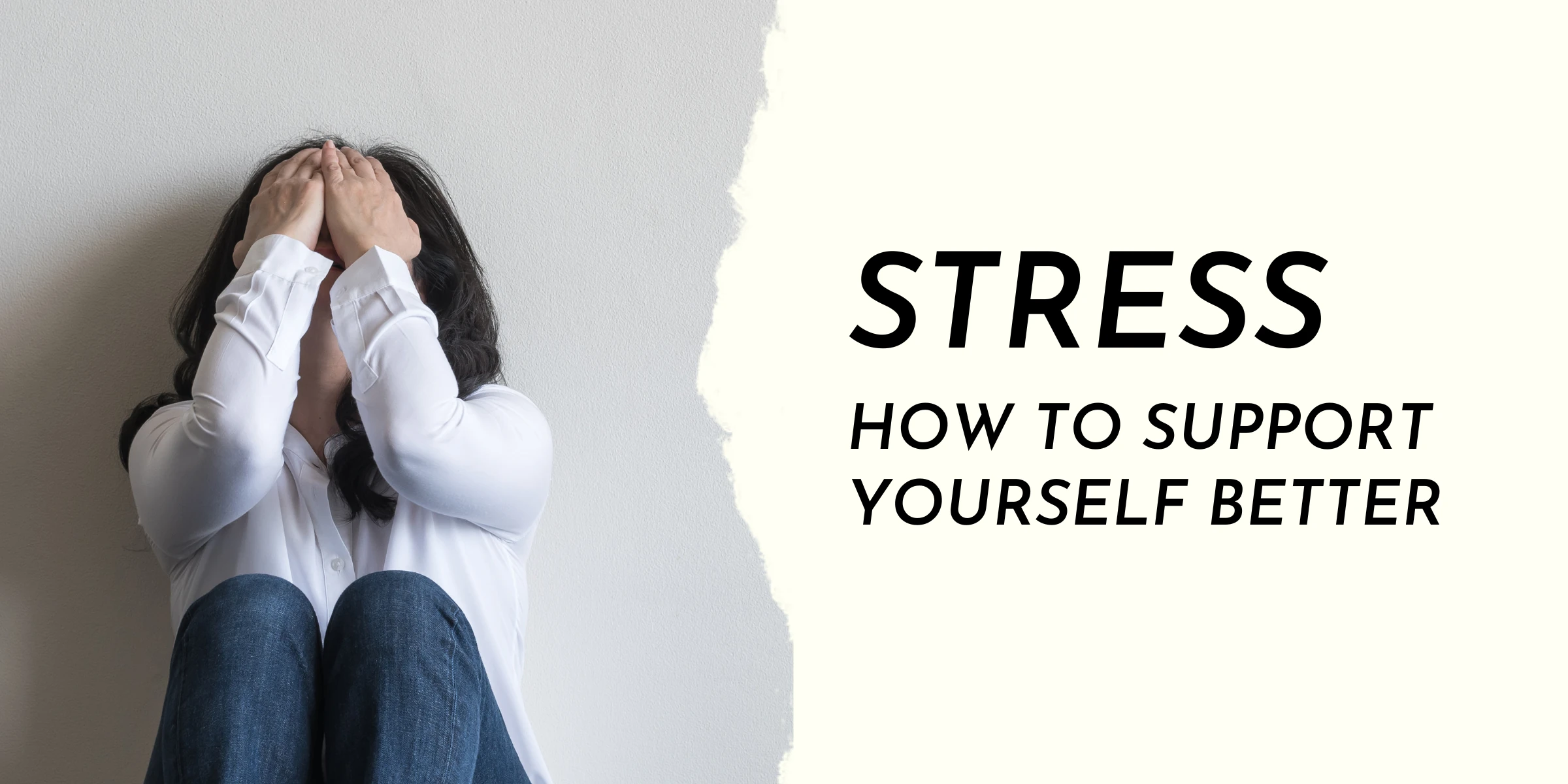

Do you ever think about your stress levels? Many people don’t realise how stressful their life is and how that might affect their health and quality of life in a negative way.
As April is stress awareness month, in this post we will share some useful information about stress and how to support yourself better through these moments in life. We will be looking at its effect on the human body and different techniques of how you can support yourself during difficult times in order to achieve positive stress response and optimise general feeling of wellbeing.
Let’s start by defining what we mean by ‘stress’ as a term and how does it affect your body? Stress is a natural human reaction to a challenging or difficult situations we often encounter in life. It is not necessarily bad for you. Stress can indeed help you to avoid situations like injuries, accidents or completing your tasks, exams or assignments successfully and on time.
Whats changing in our bodies when we are facing a stressful event? It activates the mechanism of ‘fight or flight’ in your body (stress mode) in order to respond to those triggers. Let me name them ‘stressors’.
What is the impact ‘fight or flight’ has on our bodies?
The brain signals the body and the adrenal glands release an abundance of hormones. One of them being cortisol, which is the main stress hormone. This can lead to an increase in heart rate, breathing rate, stimulate perspiration, contract blood vessels, so the blood is directed to the muscles. Releasing cortisol should not be a persistent situation, which the body needs to deal with. If it becomes chronic this can lead to health complications such as anxiety, headaches, poor sleep, tiredness, weight gain, obesity, brain fog, high blood pressure and increase cardio-vascular disease risk.
Relatedly, stress could possibly affect the nervous and digestive system and this can have an impact on which gut bacteria thrives. Research suggests that stress can influence the composition of gut bacteria in a rapid way, leading to an imbalance in the gut microbiome.
In fact, the importance of gut-brain axis is huge and the ‘communication’ between our brain and gut is so vital. Furthermore, if we don’t feel well mentally, we would not feel good physically either. Hence, if we live under chronic stress, our gut and immunity could potentially be influenced in a negative way. This could lead to variety of unpleasant symptoms such as frequent colds (low immunity), cravings for unhealthy processed foods (blood sugar imbalance), constipation, diarrhoea, dysbiosis (gut bacteria imbalance) and increase gut barrier permeability (leaky gut).
Nevertheless, what one person assimilates as a stress, can be different to another person’s response. An example of that would be going to an interview for a job. Some people can feel anxious and might overcomplicate this process and others can whole-heartly enjoy it by making it an amazing experience. Jumping out of a plane with parachute can be another version of good stress and great experience for life.
Generally speaking, after certain stressful situation, we should be activating the other mechanism, called ‘rest and digest’ (relax mode) as stress should be temporary. What that means is the body will need to relax in order to bring back the balance and maintain the homeostasis within the body.
However, in reality this is not always easy to achieve and could unfortunately lead to prolonged stress, which can be mentally and physically harmful for the body.
And did you know that stress can be the main possible trigger or mediator of any potential symptoms you might be experiencing?
You might be wondering what are the approaches to stressful situations you should be taking, after you have read all of the above.
Let me walk you through some easy and simple tips/steps on how to improve your health by focusing on achieving positive stress responses.
As nutritionists, we would encourage you to eat as clean as possible and wholefood diet. These are fresh vegetables, fruit, quality protein, loads of fibre and omega 3 rich foods. Organic where possible. Hydration is very important as well, not only for stress levels but for the entire body.
During stressful times, the following lifestyle changes can help you alleviate the levels of stress: meditation techniques, grounding, gardening, watching comedies, laughing, spending more time outside and socializing with friends and family.
Do you take any supplements to support your body during stressful events?
What nutrients does our body need the most in stressful days and challenging events, and how can we achieve the desired positive response?
There are many options out there, even more there are so many blends and combinations of herbs and nutrients, but we would like to take a look at only few for now. The following 4 products work beautifully in combination:
Madison A & Kiecolt-Glaser JK (2019) ‘Stress, depression, diet, and the gut microbiota: human–bacteria interactions at the core of psychoneuroimmunology and nutrition’ Curr Opin Behav Sci. 2019 Aug; 28: 105–110. Available online at https://www.ncbi.nlm.nih.gov/pmc/articles/PMC7213601/
Pickering G, Mazur A, Trousselard M, Bienkowski P, Yaltsewa N, Amessou M, Noah L & Pouteau E (2020) Magnesium Status and Stress: The Vicious Circle Concept Revisited. Nutrients. 2020 Dec; 12(12): 3672. Available at https://www.ncbi.nlm.nih.gov/pmc/articles/PMC7761127/#B43-nutrients-12-03672
Cernak I, Savic V, Kotur J, Prokic V, Kuljic B, Grbovic D, Veljovic M (2000) Alterations in magnesium and oxidative status during chronic emotional stress. Magnes Res. 2000 Mar;13(1):29-36. Available at https://pubmed.ncbi.nlm.nih.gov/10761188/
Hewagalamulage D S, Lee K T, Clarke J I, Henry A B (2016) Stress, cortisol, and obesity: a role for cortisol responsiveness in identifying individuals prone to obesity Review Domest Anim Endocrinol. 2016 Jul;56 Suppl:S112-20. doi: 10.1016/j.domaniend.2016.03.004. Epub 2016 Mar 31. Available at https://pubmed.ncbi.nlm.nih.gov/27345309/
Chandrasekhar K, Kapoor J and Anishetty S (2012) A Prospective, Randomized Double-Blind, Placebo-Controlled Study of Safety and Efficacy of a High-Concentration Full-Spectrum Extract of Ashwagandha Root in Reducing Stress and Anxiety in Adults. Indian J Psychol Med. 2012 Jul-Sep; 34(3): 255–262. doi: 10.4103/0253-7176.106022 Available at https://www.ncbi.nlm.nih.gov/pmc/articles/PMC3573577/
Carabotti M, Scirocco A, Maselli A M and Severia C (2015) The gut-brain axis: interactions between enteric microbiota, central and enteric nervous systems. Ann Gastroenterol. 2015 Apr-Jun; 28(2): 203–209. Available online at https://www.ncbi.nlm.nih.gov/pmc/articles/PMC4367209/
Accepting payments via


YourHealthBasket © 2025
detoxpeople Ltd
Registered in England & Wales 07156741
VAT reg GB 103 3641 60
Our new practitioner portal has been released and it’s now easier than ever to link a client’s account and provide them with suggestions using our new protocol system.
Convert your current cart into a protocol which can then be assigned to a linked client.